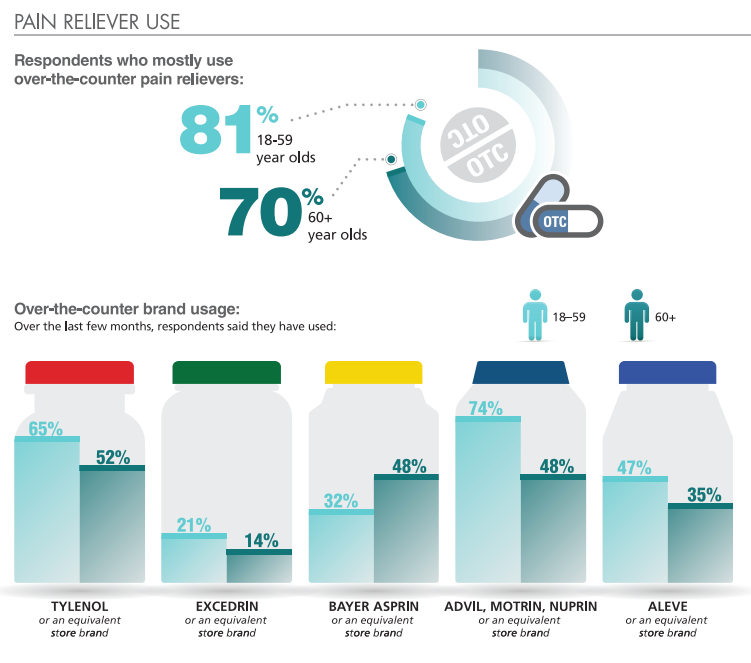
Pain is an important part of life.
Although it's uncomfortable and it's a natural reflex for us to avoid it as much as possible, it's essential.
Over-the-counter (OTC) pain meds like Aspirin, Ibuprofen and Paracetamol are popular medications that we like to use against headaches, a common cold, or other minor injuries.
But have you ever asked yourself how they actually work?

The Importance of Pain
We may think that pain is uncomfortable or even unnecessary, but it's quite the contrary.
Pain signals us that we're damaging our body - and stops us from doing it.
Without it, we could easily get hurt or hurt ourselves without even noticing, and then the effects might become much worse.
I will only touch on this topic briefly, because I'm planning to write a whole other in-depth post about this topic alone, but as awesome as a life without pain sounds - it wouldn't be very fun for long.
Pain in the body
So how do feel pain?
There are certain specialized cells all over our body, that act like pain detectors. They are called Nociceptors.
They're not always active, they only fire if something could, or is causing damage to our body.
For example:
If you gently touch the blade of a knife with your finger, you can feel the metal, but it won't hurt yet.
The more you push, the closer you get to the nociceptor threshold, and the more it will hurt.
When the cells are damaged, for example when you have an injury like a cut or an open wound, the cells in that area produce so-called tuning chemicals.
These chemicals lower the nociceptor threshold even more.
This means that even the slightest touch, which normally wouldn't hurt, could now be painful.
(For example, compare the feeling of touching healthy tissue vs. a bruise!)

How Pain relievers work
Damaged cells are releasing a chemical called Arachidonic Acid.
This chemical then gets converted by 2 enzymes, called Cox-1 and Cox-2.
They convert it into Prostaglandin H2, which then again gets converted into a number of other chemicals that cause multiple reactions - for example inflammation, swelling, increased heart rate, raised body temperature, and lowering the pain threshold, like mentioned above.
Pain relievers like Aspirin, Ibuprofen and Paracetamol actually work in the active sites of those 2 enzymes Cox-1 and Cox-2.
Imagine the active site like a keyhole.
The arachidonic acid (the chemical from the damaged cells) fits in that keyhole perfectly, just like a manufactured key.

Ibuprofen enters the active site, and stays there - it's blocking the keyhole, making it impossible for the actual key to get in and impossible for the chemical reaction that causes pain to happen. After a few hours, it gets spit out by the enzyme again.

Aspirin also enters the active site but it breaks itself off and half of it stays in there - again blocking the keyhole, and totally deactivating cox-1 and cox-2.

Paracetamol on the other hand only works after the bonding of enzymes with the arachidonic acid happened, and it inhibits some of the effects from that reaction. That's why paracetamol relieves pain and feaver, but doesn't reduce inflammation, for example.
How do they know where the pain is?
They actually don't.
These "simple" pain relievers enter your bloodstream, and access every part of your body - they don't know whether you experience pain in that particular area or not.
Obviously, there are a lot of other kinds of pain killers - and much stronger ones.
Aspirin, Ibuprofen and Paracetamol only work for minor issues like headaches or fever.
Other pain killers like morphine or oxycodone are much more complex, and are being used in hospitals when you have a lot of pain and serious injuries like fractured bones.
Pain works in many different ways inside our body.
It can be a blessing or a curse, but in general, it's only there to protect us!
Images: 1, 2, 3, 4, 5, 6, Sources: 1, 2, 3, 4
- Instagram -

Sirwinchester
Really interesting how they just stay in the active site and block it. Had no idea that it works this way
Glad to hear that you learned something new!
This is really interesting and very well explained! I tend to have a lot of headaches and it seems like Advil has been my best friend. Obviously, I need to take a real look at what is causing these headaches instead of just accepting it and medicating. Thanks for the post!!
Thank you for your feedback, and happy to hear that you enjoyed the post!
amazing work as usual :)
Thank you! :)
This was a really cool article! Well done. And not just physical pain, but emotional pain as well. They both can serve as mechanisms on how we may need to go about something differently.
Thank you, appreciate the compliment!
And yes you're right, of course emotional pain is a totally different, but also very important kind of pain.
This post has been ranked within the top 25 most undervalued posts in the second half of Dec 30. We estimate that this post is undervalued by $15.64 as compared to a scenario in which every voter had an equal say.
See the full rankings and details in The Daily Tribune: Dec 30 - Part II. You can also read about some of our methodology, data analysis and technical details in our initial post.
If you are the author and would prefer not to receive these comments, simply reply "Stop" to this comment.